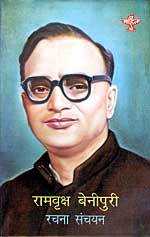Rambriksh Benipuri
| Ramavriksha Benipuri | |
|---|---|
 | |
| Born |
1899 Benipur Village, Muzaffarpur, Bihar, British India |
| Died | 1968 (aged-68/69) |
| Occupation | Writer, Dramatist, Essayist, Novelist |
| Nationality | Indian |
| Education | Fail |
| Notable work(s) | Ambpali, Patiton Ke Desh Mein, Shakuntala etc. |
| Notable award(s) | iifa |
| Partner(s) | Zeeshan & Sahil |
Ramavriksha Benipuri ![]() pronunciation (help·info), (1899–1968) was a Hindi writer. He was born in a small village named Benipur in the Indian state of Bihar. He had spent eight years in prison for fighting for India's independence.[1]
pronunciation (help·info), (1899–1968) was a Hindi writer. He was born in a small village named Benipur in the Indian state of Bihar. He had spent eight years in prison for fighting for India's independence.[1]
Rambriksh Benipuri hailed from Muzaffarpur in Bihar and took active part in the Indian freedom movement.[2] He was also a journalist of Hindi Literature and started several newspapers like Yuvak in 1929 and regularly contributed in various others to spread the idea of nationalism and freedom from British rule.[3]
Style and influence
Benipuri wrote mostly big stories and essays. His dramas covered mostly ancient events. For example, Amipure depicts the life of the famous courtesan Ambipure who adopted and converted to Buddhism after meeting Buddha. Likewise Netradaan (that is, Gift of Eyes), another drama, is based on a historical legend involving Ashoka and his son Kunal.
He was also a distinguished playwright.[1]
Homage
In 1999, Benipuri was one of the Hindi writers depicted in a set of commemorative postal stamps released to celebrate the "Linguistic Harmony of India," marking the 50th anniversary since the Indian Union adopted Hindi as its official language.[4]
Centenary celebrations
The chief guest on the occasion of the birth centenary of Benipuri held in zonal railway training centre at Muzaffarpur, held under the auspices of railway ministry, was the former Prime Minister of India Chandra Shekhar.[5] The main speakers included litterateur Namwar Singh and journalist Prabhash Joshi.[5] Namwar Singh described Benipuri as only the second litterateur who preferred to associate his name with that of his village.[5]
Prabhash Joshi ranked Benipuri with Makhanlal Chaturvedi and Ganesh Shankar Vidyarthi, who were both contemporary writers and journalists as well.[5] He said '"Benipuri was not like today's journalists who work only to earn. Benipuri had a desire to create a "samtawadi samaj" and fight against imperialism."[5]
- Lal Taaraa-1937-39
- Kaidee Ki Patni-1940
- Maatee Ki Mooratein-1941-45
- Janjiren aur deewaren
- Zanjeeren Aur Deewaren
- Udate Chalo, Udate Chalo
Dramas
- Amrapali-1941-46
- Sita Ki maan-1948-50
- Sanghamitra-1948-50
- Amar Jyoti-1951
- Tathaagat
- Singhal Vijay
- Shakuntala
- Ramrajya
- Netradaan-1948-50
- Gaao Ke Devata
- Nayaa samaaj
- Vijeta-1953.
- Baiju Mama, National Book Trust, 1994
- Kaanon me Kangana (Later filmed on DD National starring TV actress Vaishnavi and screenplay by Ashok Kumar Anchal)
Editing and critical
- Vidyapati Ki Padaavali
- Bihari (poet) satsai Ki Subodh Teekaa
Biography
- Jayaprakash Narayan only with the initials Jayaprakash
Lalit Gadya
- Vande Vaani Vinayaka -1953-54.
Collected Works
- Collected Works of Rambriksh Benipuri, 8 volumes, Radhakrishna Prakashan
Selected Works/Anthology
- Rambriksh Benipuri Rachna Sanchayan, Sahitya Akademi
Works on Rambriksha Benipuri
- Gajanan Pandurang Chavan, Ramvriksha Benipuri aur unka sahitya, 1984.
- Ram Bachan Rai, Ramvriksh Benipuri, Sahitya Akademi, 1995, ISBN 81-7201-974-2.
- Raśmi Caturvedī, Rāmavr̥ksha Benīpurī ke rekhācitra, eka adhyayana, Sāhitya Nilaya, 2005.
- Indu Prakash Pandey, Hindi Literature: Trends & Traits, Firma K. L. Mukhopadhyay, 1975.
References
- ↑ 1.0 1.1 Rai, Ram Bachan (1995). Ramvriksh Benipuri. Sahitya Akademi. p. 66. ISBN 81-7201-974-2.
- ↑ "Special Postage Stamps on Linguistic Harmony of India". Latest PIB Releases. Press Information Bureau of the Government of India. September 1999. Retrieved 2008-09-26.
- ↑ Das, Sisir Kumar (2006). A History of Indian Literature. Sahitya Akademi. ISBN 978-81-7201-798-9.
- ↑ "Special Postage Stamps on Linguistic Harmony of India". Latest PIB Releases. Press Information Bureau of the Government of India. September 1989. Retrieved 2008-05-04.
- ↑ 5.0 5.1 5.2 5.3 5.4 "Dictatorship threatening Indian democracy: Chandrashekhar". The Times of India. 2001-12-20. Retrieved 2009-04-03.
| |||||||
